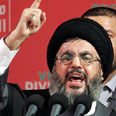In a speech broadcasted Sunday on the al-Manar television network, Hizbullah
Secretary-General Sheikh Hassan Nasrallah
called on his followers to “prepare to take to the streets”.
Throughout the speech which dealt mostly with the political crisis in Lebanon following last summer's war, Nasrallah repeated his demand to enlarge the organization’s representation in the Lebanese government by one third.
Alternatively, if the enlargement takes place, Hizbullah could veto important decisions or lead Lebanon into early elections.
Planning Coup?
Roee Nahmias
Lebanese Mufti claims political happenings in Lebanon constitute war between Islamic sects: 'Everyone will learn that Iran is trying to meddle in the entire Arab world'. Druze leader Jumblatt: 'We will never surrender to Hizbullah'
Nasrallah said, “The Lebanese government has two options – establishing a national unity government or early elections.” He attacked the ruling government claiming that in the absence of Hizbullah and Amal ministers, its legality should be questioned.
“This is Ambassador Feltman’s (US ambassador to Beirut) government, not Siniora’s,” he accused.
“The ruling group is in a position where it feels it has been defeated following what happened during the last war. It resists just demands to establish a national unity government in order to maintain its power,” Nasrallah explained.
Serving Iranian nuclear issue?
Throughout the speech, Nasrallah justified the reason his ministers and Amal’s ministers resigned from the government and said that the resignation had no connection to the issue of establishing an international court in Lebanon.The resignation occurred the day following an announcement by Lebanese Prime Minister Fouad Siniora that he intended on bringing up the issue in the next government meeting. The international court that was to be discussed would prosecute those suspected of Rafik Hariri’s assassination.
Despite this, Nasrallah rejected accusations that his organization intended on changing the internal agenda in Lebanon as decided on in the Taef agreements (1989).
“We support the Taef agreements and the realizing of all its clauses, contrary to what the ruling opposing group’s claims. Hizbullah has never attempted to form a country within a country,” he said.
Nasrahalla also refuted claims that his political move in Lebanon was meant to serve the Iranian nuclear issue calling it the “silliest accusation”.

Secretary-General Sheikh Hassan Nasrallah
Photo: AP
מומלצים















